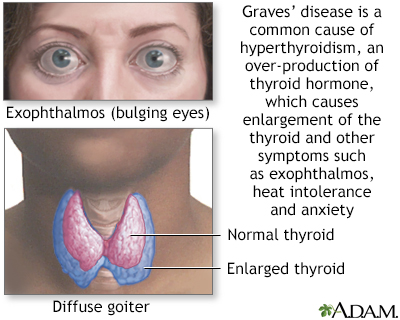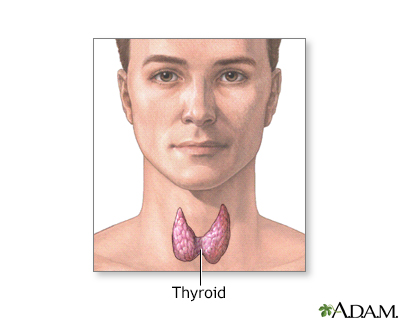Graves disease
Diffuse thyrotoxic goiter; Hyperthyroidism - Graves; Thyrotoxicosis - Graves; Exophthalmos - Graves; Ophthalmopathy - Graves; Exophthalmia - Graves; Exorbitism - Graves; Graves' disease
Graves disease is an autoimmune disorder that leads to an overactive thyroid gland (hyperthyroidism). An autoimmune disorder is a condition that occurs when the immune system mistakenly attacks healthy tissue.
Images




I Would Like to Learn About:
Causes
The thyroid gland is an important organ of the endocrine system. The gland is located at the front of the neck above where the collarbones meet. This gland releases the hormones thyroxine (T4) and triiodothyronine (T3), which control body metabolism. Controlling metabolism is important for regulating mood, weight, and mental and physical energy levels.
When the body makes too much thyroid hormone, the condition is called hyperthyroidism. (An underactive thyroid leads to hypothyroidism.)
Graves disease is the most common cause of hyperthyroidism. It is due to an abnormal immune system response that causes the thyroid gland to produce too much thyroid hormone. Graves disease is most common in women over age 20. But the disorder can occur at any age and can affect men as well.
Symptoms
Younger people may have these symptoms:
- Anxiety or nervousness, as well as problems sleeping
- Breast enlargement in men (possible)
- Problems concentrating
- Fatigue
- Frequent bowel movements
- Hair loss
- Heat intolerance and increased sweating
- Increased appetite, despite having weight loss
- Irregular menstrual periods in women
- Muscle weakness of the hips and shoulders
- Moodiness, including irritability and anger
- Palpitations (sensation of a strong or unusual heartbeat)
- Rapid or irregular heartbeat
- Shortness of breath with activity
- Shaking hands (tremors)
- Weight loss
Many people with Graves disease have problems with their eyes:
- The eyeballs may seem to be bulging out and may be painful.
- Eyes can feel irritated, itchy, or tear more frequently.
- Double vision may be present.
- Decreased vision and damage to the cornea can also occur in severe cases.
Older people may have these symptoms:
- Rapid or irregular heartbeat
- Chest pain
- Memory loss or decreased concentration
- Weakness and fatigue
Exams and Tests
During the physical exam, your health care provider may find:
- You have an increased heart rate
- Your thyroid gland may be enlarged (goiter)
Other tests include:
- Blood tests to measure levels of thyroid stimulating hormone (TSH), T3, and free T4
- Radioactive iodine uptake and scan
This disease may also affect the following test results:
- Orbit CT scan or ultrasound
- Thyroid stimulating immunoglobulin (TSI)
- Thyroid peroxidase (TPO) antibody
- Anti-TSH receptor antibody (TRAb)
Treatment
Treatment is aimed at controlling your overactive thyroid. You may receive one or more types of treatment.
Beta-blocker medicines may help treat:
- Rapid heart rate
- Sweating
- Anxiety
They may be given until the hyperthyroidism is controlled.
Antithyroid medicines:
- Block or change how the thyroid gland uses iodine
- May be used to control the overactive thyroid gland before surgery or radioiodine therapy
- May be used as a long-term treatment
Radioactive iodine is given by mouth. It then concentrates in the overactive thyroid tissue and causes damage.
Surgery may be done to remove the thyroid.
If you have had radioactive iodine treatment or surgery, you will need to take replacement thyroid hormones for the rest of your life. This is because these treatments destroy or remove the gland.
TREATMENT OF THE EYES
Some of the eye problems related to Graves disease often improve after treatment with medicines (including selenium), radiation, or surgery. Radioiodine therapy can sometimes make eye problems worse. Eye problems are worse in people who smoke, even after the hyperthyroidism is treated.
Sometimes, prednisone is needed to reduce eye irritation and swelling. Prednisone is a steroid medicine that suppresses the immune system. Other treatments to suppress the immune system may be needed. Ask your provider if these would help you.
Sunglasses, cool compresses, and eye drops may reduce eye irritation. In rare cases, surgery or radiation therapy (different from radioactive iodine) may be needed to prevent further damage to the eye and loss of vision.
Outlook (Prognosis)
Graves disease often responds well to treatment. Thyroid surgery or radioactive iodine often will cause an underactive thyroid (hypothyroidism). Without getting the correct dosage of thyroid hormone replacement, hypothyroidism can lead to:
- Depression
- Mental and physical sluggishness
- Weight gain
- Dry skin
- Constipation
- Cold intolerance
- Abnormal menstrual periods in women
When to Contact a Medical Professional
Contact your provider if you have symptoms of Graves disease or your eye problems or other symptoms get worse or do not improve with treatment.
Go to the emergency room or call 911 or the local emergency number if you have symptoms of hyperthyroidism with:
- Decrease in consciousness
- Fever
- Rapid, irregular heartbeat
- Sudden shortness of breath
Related Information
HyperthyroidismEndocrine glands
Free T4 test
T3 test
Metabolism
Hypothyroidism
Eyes - bulging
Pulse - bounding
Atrial fibrillation and atrial flutter
References
Hollenberg A, Wiersinga WM. Hyperthyroid disorders. In: Melmed S, Auchus RJ, Golfine AB, Koenig RJ, Rosen CJ, eds. Williams Textbook of Endocrinology. 14th ed. Philadelphia, PA: Elsevier; 2020:chap 12.
Pearce EN, Hollenberg AN. Thyroid. In: Goldman L, Cooney KA, eds. Goldman-Cecil Medicine. 27th ed. Philadelphia, PA: Elsevier; 2024:chap 207.
Smith JR, Wassner AJ. Thyrotoxicosis. In: Kliegman RM, St. Geme JW, Blum NJ, Shah SS, Tasker RC, Wilson KM, eds. Nelson Textbook of Pediatrics. 21st ed. Philadelphia, PA: Elsevier; 2020:chap 584.
Weetman AP, Kahaly GJ. Graves disease. In: Robertson RP, ed. DeGroot's Endocrinology. 8th ed. Philadelphia, PA: Elsevier; 2023:chap 71.
BACK TO TOPReview Date: 2/28/2024
Reviewed By: Sandeep K. Dhaliwal, MD, board-certified in Diabetes, Endocrinology, and Metabolism, Springfield, VA. Also reviewed by David C. Dugdale, MD, Medical Director, Brenda Conaway, Editorial Director, and the A.D.A.M. Editorial team.

Health Content Provider
06/01/2025
|
A.D.A.M., Inc. is accredited by URAC, for Health Content Provider (www.urac.org). URAC's accreditation program is an independent audit to verify that A.D.A.M. follows rigorous standards of quality and accountability. A.D.A.M. is among the first to achieve this important distinction for online health information and services. Learn more about A.D.A.M.'s editorial policy, editorial process and privacy policy. A.D.A.M. is also a founding member of Hi-Ethics. This site complied with the HONcode standard for trustworthy health information from 1995 to 2022, after which HON (Health On the Net, a not-for-profit organization that promoted transparent and reliable health information online) was discontinued. |
The information provided herein should not be used during any medical emergency or for the diagnosis or treatment of any medical condition. A licensed medical professional should be consulted for diagnosis and treatment of any and all medical conditions. Links to other sites are provided for information only -- they do not constitute endorsements of those other sites. © 1997- 2025 A.D.A.M., a business unit of Ebix, Inc. Any duplication or distribution of the information contained herein is strictly prohibited.
